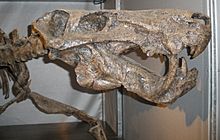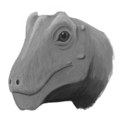Therapsid facts for kids
Quick facts for kids TherapsidaTemporal range: Lower Permian – Lower Cretaceous (non-mammalian)
|
|
|---|---|
 |
|
| Inostrancevia, a therapsid | |
| Scientific classification | |
| Kingdom: | |
| Phylum: | |
| Subphylum: | |
| Superclass: | |
| Class: | |
| Order: |
Therapsida *
Broom 1905
|
| Clades | |
|
|
Therapsids, previously known as the mammal-like reptiles, are an order of synapsids.
The clade includes the mammals, which are descended from the cynodont therapsids.
Characteristics
The jaws of therapsids had frontal incisors for nipping, large lateral canines for puncturing and tearing, and molars for shearing and tearing, and molars for shearing and chopping food.
Therapsid legs were positioned more vertically beneath their bodies than were the sprawling legs of Sauropsids and Pelycosaurs.
Evolution
The therapsids were seriously affected by the P/Tr extinction event. The successful gorgonopsians died out, and the remaining groups were much reduced.
The dicynodonts, now represented by a single family of large stocky herbivores, the Kannemeyeridae, and the medium-sized cynodonts (including both carnivorous and herbivorous forms), flourished worldwide, throughout the early to middle Triassic. They died out across much of Pangea before the end of the Upper Triassic, although they continued for some time longer in the wet equatorial band and the south.
At least three groups of eucynodonts survived. They appeared in the Upper Triassic. The extremely mammal-like family, the Tritylodonts, survived into the Lower Cretaceous. Another group, Morganucodon and similar animals, were mammaliaformes or the "stem-mammals" for the mammals.
Taxonomy
- Class Synapsida
- ORDER THERAPSIDA *
- Suborder Biarmosuchia *
- Suborder Dinocephalia
- Suborder Anomodontia *
- Superfamily Venyukoviamorpha
- Infraorder Dicynodonta
- (unranked) Theriodontia *
- Suborder Gorgonopsia
- Suborder Therocephalia
- Suborder Cynodontia *
- (unranked) Mammaliaformes *
- Class Mammalia
- Kemp T.S. 2005. The origin and evolution of mammals. Oxford University Press
- Benton M.J. 2004. Vertebrate Paleontology. 3rd ed. Blackwell, Oxford.
- Carroll R.L. 1988 Vertebrate Paleontology & Evolution. Freeman N.Y.
- Romer A.S. 1966. Vertebrate Paleontology. 3rd ed, University of Chicago Press.
Images for kids
-
Illustration of Pristerognathus, a cat-sized therocephalian therapsid
-
Bauria, a therocephalian
See also
 In Spanish: Terápsidos para niños
In Spanish: Terápsidos para niños







